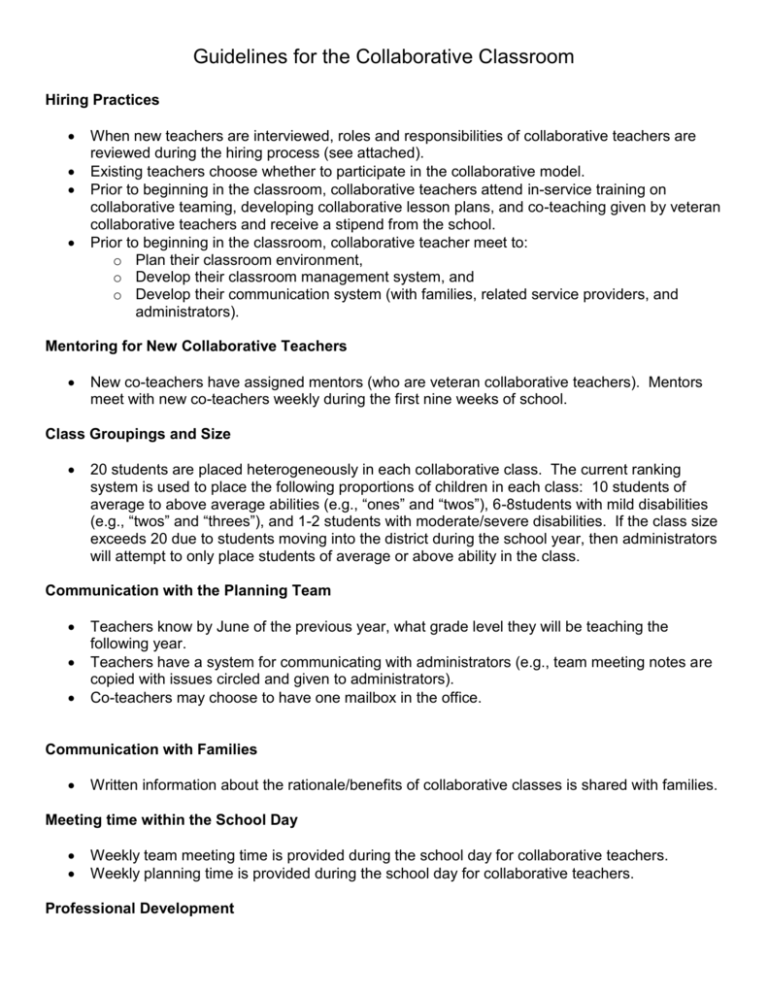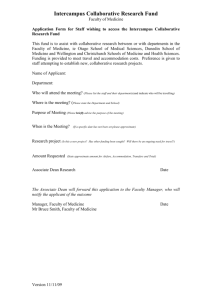Guidelines for the Collaborative Classroom
advertisement

Guidelines for the Collaborative Classroom Hiring Practices When new teachers are interviewed, roles and responsibilities of collaborative teachers are reviewed during the hiring process (see attached). Existing teachers choose whether to participate in the collaborative model. Prior to beginning in the classroom, collaborative teachers attend in-service training on collaborative teaming, developing collaborative lesson plans, and co-teaching given by veteran collaborative teachers and receive a stipend from the school. Prior to beginning in the classroom, collaborative teacher meet to: o Plan their classroom environment, o Develop their classroom management system, and o Develop their communication system (with families, related service providers, and administrators). Mentoring for New Collaborative Teachers New co-teachers have assigned mentors (who are veteran collaborative teachers). Mentors meet with new co-teachers weekly during the first nine weeks of school. Class Groupings and Size 20 students are placed heterogeneously in each collaborative class. The current ranking system is used to place the following proportions of children in each class: 10 students of average to above average abilities (e.g., “ones” and “twos”), 6-8students with mild disabilities (e.g., “twos” and “threes”), and 1-2 students with moderate/severe disabilities. If the class size exceeds 20 due to students moving into the district during the school year, then administrators will attempt to only place students of average or above ability in the class. Communication with the Planning Team Teachers know by June of the previous year, what grade level they will be teaching the following year. Teachers have a system for communicating with administrators (e.g., team meeting notes are copied with issues circled and given to administrators). Co-teachers may choose to have one mailbox in the office. Communication with Families Written information about the rationale/benefits of collaborative classes is shared with families. Meeting time within the School Day Weekly team meeting time is provided during the school day for collaborative teachers. Weekly planning time is provided during the school day for collaborative teachers. Professional Development Teachers in the collaborative classes are kept abreast of professional development opportunities regarding co-teaching. Substitutes If a teacher in a collaborative class is absent, she/he schedules a substitute to take her/his place. No more than one substitute works in a collaborative class on a given day. A collaborative teacher from another grade level/class trades with the second substitute. IEP Development Faculty use a consistent process in all IEP meetings where pros and cons are presented about all the placement options prior to making placement decisions. Planning Team A core planning team, consisting of an administrator, a co-teacher, and a parent meets three times a year to ensure the collaborative program’s success. Evaluation Procedures Teachers collect pre- and post-evaluation data on all the students in their classes using an agreed upon procedure. Families complete yearly evaluation forms regarding their satisfaction with the collaborative classrooms. Revised March, 2008








